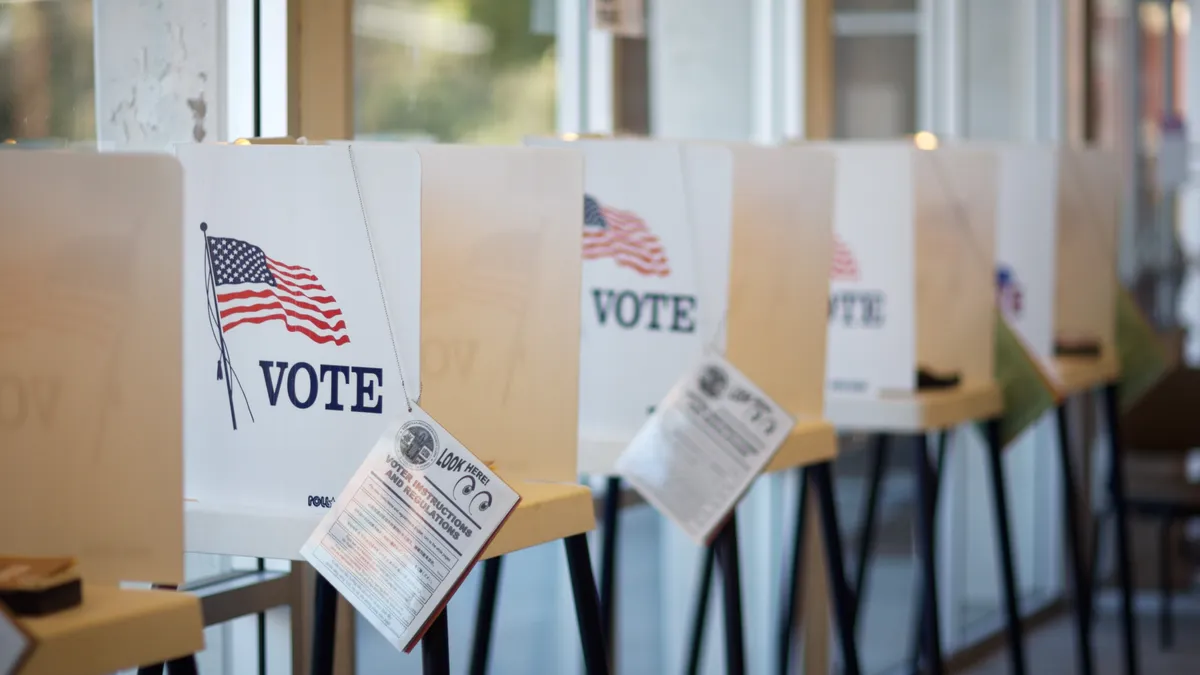While the outcome of the presidential race is drawing the majority of attention, a number of state propositions on the ballot Tuesday will have a direct influence on technology policy.
Some proposals deal with consumers rights to their data, expanding on existing legislation or adding limits to the government's ability to access data. Another initiative would require car makers to create an open data platform starting in 2022.
The focus is largely on California, where a trio of proposals address privacy rights, the use of algorithms to determine flight risk and the exclusion of app-based rideshare drivers from state labor legislation that previously classified them as employees.
California led the nation as the first state to pass data privacy legislation when former Gov. Jerry Brown signed the California Consumer Privacy Act into law in 2018. Now, the state ballot measure proposes an expansion of existing privacy regulations and the creation of a new oversight agency.
Here are five state ballot proposals to watch as voters head to the polls on Nov. 2:
PASSED — California: Proposition 22
Rideshare and delivery drivers in California will closely watch the outcome of Proposition 22, a state statute that, if approved, would create exceptions to allow companies such as Uber, Lyft and Doordash to avoid classifying drivers as employees. In California, the AB-5 law that went into effect Jan. 1 classified drivers working for app-based companies as employees.
Following a contentious court battle, Uber and Lyft were mandated to reclassify drivers in California as employees on Aug. 10, but later received a stay that deferred the effects of the AB-5 classification.
Ridesharing companies and labor associations have spent north of $200 million in ads as surveys show voters are split on the issue.
PASSED — California: Proposition 24
A "yes" vote on the California Privacy Rights Act of 2020 will expand the reach of the state’s existing consumer data privacy law.
If the measure passes, the state will create the California Privacy Protection Agency, and broaden requirements on businesses operating with consumer data. Businesses will need to obtain permission before collecting data from consumers younger than 16, or a parent or guardian if consumers are younger than 13.
Additionally, organizations will need to give consumers the ability to opt-out from having sensitive personal information used or disclosed for advertising purposes.
NOT PASSED — California: Proposition 25
Proposition 25 seeks to replace the state's current cash bail system with an algorithmic risk-assessment tool that would determine whether criminal suspects are granted pretrial release.
Algorithmically-generated risk scores to determine flight-risk have garnered criticism, drawing concern over racial disparities in the outcomes of the algorithm. Pennsylvania approved the use of algorithmic pretrial assessments in 2019.
PASSED — Massachusetts: Question 1
The Massachusetts initiative would require car makers selling vehicles in Massachusetts to create a standardized open data platform starting with vehicles with model year 2022.
The update will allow vehicle owners and independent repair facilities to access mechanical data and run diagnostics through a mobile-based application.
If approved, the bill would bypass existing exemptions in Massachusetts' 2013 right-to-repair law, expanding wireless access to car telematic systems. Critics of the initiative cite cybersecurity concerns with opening wireless access to car data.
PASSED — Michigan: Proposal 2
Michigan voters will be asked to weigh in on a proposal that will require a search warrant to access a person's electronic data or electronic communications.
The amendment to the state constitution, if approved, will dictate the data and electronic communications "of every person shall be secure from unreasonable searches and seizures."













